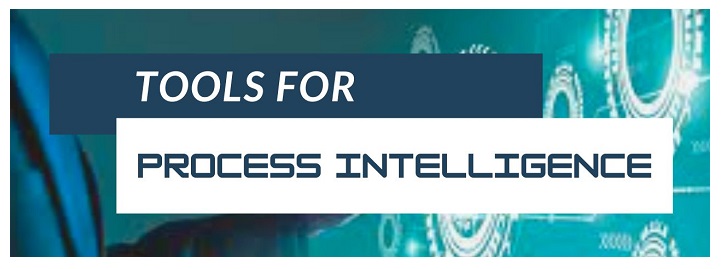
- Process Intelligence - Home
- Process Intelligence - Introduction
- Process Intelligence vs Process Mining
- Process Intelligence - Data Collection
- Process Intelligence - Tools
- Process Intelligence - Applications
- Process Intelligence - Benefits
- Process Intelligence - Challenges
Process Intelligence - Tools
In todays world of data and technological advancement, business organizations constantly require techniques and tools to enhance operational efficiencies in their processes, improve customer experiences, and achieve sustainability in the business. Process intelligence tools play an important in achieving all these goals, as they allow business organizations to deeply analyze and understand their processes and workflows to identify inefficiencies and make informed decisions to optimize them.

This chapter is meant for explaining the functions and importance of various process intelligence tools. The main function of process intelligence tools is to use data to determine how business processes in an organization run and how they can be optimized.
What is a Process Intelligence Tool?
Process intelligence tools are advanced technologies, software, and methodologies designed and used to monitor, analyze, and optimize the business processes. These tools collect data from various sources like ERP, CRM, and workflow monitoring systems and process them to provide actionable insights to optimize workflows in the organization.
Process intelligence tools allow business organizations to perform the following key activities −
- Identify inefficiencies and problems in processes and workflows
- Measure performance of the processes
- Determine areas of automation
- Provides insights to enhance productivity
- Predict future trends and outcomes, etc.
Main Functions of Process Intelligence Tools
Process intelligence tools typically perform the following key functions in a business organization −
- Collects data from various sources
- Creates visualizations and maps of processes and workflows
- Analyzes the collected data to identify inefficiencies and areas that need optimization
- Monitors the performance of workflows and processes in real-time
Let's now have a discussion on some key tools used for implementing process intelligence in business organizations.
Process Mining Tools
These are tools developed and utilized for analyzing event logs from various enterprise systems like EPR, CRM, etc. Process mining tools provide information about how processes are actually executed. In short, these tools provide a clear view of processes and workflows within the business organization.
The key functions that process mining tools perform include –
- Data extraction from various systems like ERP, CRM, workflow monitoring systems, etc.
- Creates visuals and maps of processes and workflows to identify inefficiencies
- Highlights the key reasons of potential issues and risks
Hence, business organizations find process mining tools important because of the following reasons −
- Helps organizations to deeply understand their workflows and processes.
- Allows them to perform data-driven process improvements.
Workflow Automation Tools
As the name implies, workflow automation tools are those process intelligence tools that designed and used to automate repetitive tasks and streamline business operations. These tools help reducing manual, human intervention in the processes and workflows, and improve operational efficiencies.
The key functions that workflow automation tools perform in process intelligence are as follows −
- Automates repetitive, routine tasks and processes within an organization
- Provides data analytics about performance of workflows
- Reduces human intervention in process executions
Therefore, workflow automation tools are also important parts of process intelligence due to the following reasons −
- Allows organizations to eliminate human involvement and errors in processes.
- Helps organizations to scale their operations and enhance the operational efficiency.
- Frees up human resources for higher-value tasks and operations.
Business Process Management (BPM) Tools
Another important process intelligence tools are business process management (BPM) software. These tools are designed to systematically model, execute, monitor, and improve the processes of a business organization.
The main functions that BPM software perform as a process intelligence tool include −
- Allows organizations to model processes with simple drag-and-drop capabilities
- Provides a platform to manage business processes and workflows
- Creates interactive dashboards for real-time monitoring of processes, etc.
BPM software marks their importance in process intelligence because of the following key reasons −
- Allow organizations to control their end-to-end processes.
- Help organization to ensure that workflows align with their business goals.
- Ensure that processes meet the compliance requirements, etc.
Data Analytics Platforms
Data analytics platforms are also important tools used in process intelligence. These tools provide capabilities to analyze large volumes of process-related data of a business organization. They help gaining insights about process performance, identify patterns, and predict trends.
Some of the key functions that data analytics platforms perform as a process intelligence tool are as follows −
- Collects and analyzes data from various sources within the organization.
- Uses advanced algorithms and machine learning capabilities to identify inefficiencies and bottlenecks.
- Allows to perform predictive analytics to optimize workflows and processes.
The following features of data analytics platforms make them important in process intelligence −
- Provides capabilities of data-driven decision making
- Helps organizations to predict potential issues
- Allows protectively optimize the workflows and processes, etc.
Process Monitoring Tools
In process intelligence, process monitoring tools provide capabilities to monitor and track the real-time performance of processes and workflows. They provide alerts and help avoiding potential issues in process executions.
The following are key functions of process monitoring tools in process intelligence −
- Performs real-time tracking of processes and workflows
- Provides alerts for issues and deviations
- Allows automation systems to automatically take corrective actions
The benefits making process monitoring tools important in process intelligence include −
- Makes process executions smoother
- Allows to meet regulatory standards in workflows
- Reduces errors and breakdowns, etc.
Conclusion
Process intelligence tools are important parts for optimizing business processes and enhancing operational efficiency of business workflows. In this chapter, we have discussed the functions and importance of various process intelligence tools that businesses commonly employ in their organizations